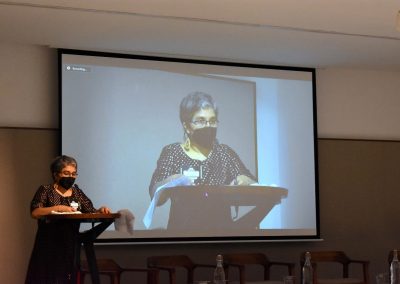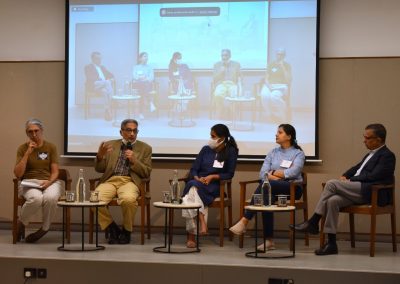“It is heartening to see CITAPP complete its first decade. Ten years after its founding, it uniquely remains India’s only center dedicated to probing the policy questions that emerge from the design, deployment and use of information/digital technologies. CITAPP has also attracted excellent faculty members and enthusiastic students who have strengthened its intellectual purpose. As a result, the Center has emerged a prominent port-of-call in India for diverse actors (including governments, NGOs, and international organizations), keen to address matters of significance at the intersection of technology and policy. These aspects bode well for CITAPP in the years ahead,” says Prof. Balaji Parthasarthy, Advisor and Faculty Member at CITAPP who shared his views on CITAPP completing 10 years.
Public policy is an institutionalized proposal to solve relevant and real-world problems, guided by a conception and implemented by programs as a course of action created and/or enacted, typically by a government or non-profit organization, in response to social issues. CITAPP was established in 2012 at IIIT Bangalore with an aim to nurture and transform such public policies through the use of Information and Communication Technologies (ICTs) by engaging with academic faculty and researchers, policy planners, political leaders, technology vendors, public officials and other relevant stakeholders.
Commenting on a query around the value additions of CITAPP so far to address the policy challenges and organizational demands, Prof. Balaji says, “Since the organizational demands that accompany technological change are varied, the value-addition of CITAPP’s work is in explaining the variations and their implications to social actors. For instance, as mobile communication technologies have changed, work at CITAPP has examined how to price and allocate spectrum efficiently while protecting the interests of stakeholders including service providers, the government and users. In the debate on making identity systems such as Aadhaar mandatory, research shows how the mandate affected different demographic and socio-economic groups, and domains such as the public distribution system and healthcare. Another example is how digital platforms, which rely on gig workers to deliver the convenience of on-demand services, have come to adopt exploitative labour practices.”
So far, CITAPP has brought together best practices demonstrating the power of ICT and analytical tools for information management, modeling, and forecasting. It has been engaging in research and evaluation studies of topics where ICT and public interest intersect. Some of the successful research works include:
- COVID Data Infrastructure Builders: Creating Resilient and Sustainable Research Collaborations
- Gender Professionalization and Digital Platforms: The Case of Beauticians in India
- Fairwork Foundation: Towards Fairwork in the Platform Economy
- Creative Communication to Promote Resilient Agricultural Practice
- Online and Offline livelihoods – An analysis of the impact of the gig economy on worker participation
To mark a decade’s success, CITAPP held an event, ‘Def(in/y)ing Boundaries’ on April 9 at Bangalore International Centre (BIC). Two panel discussions were the highlights of the event, “Breaking boundaries in research and practice”, featuring Balaji Parthasarathy (IIIT-Bangalore), Nachiket Mor (Banyan Academy of Leadership in Mental Health), Sobia Rafiq (Sensing Local) and Tanuja Ganu (Microsoft Research, India) and “Breaking boundaries in class and outside”, featuring current students and alumni of the institute’s MSc (Digital Society), MS (by Research) and PhD programmes.
Wishing on the successful journey of CITAPP, our Director, Prof. Debabrata Das said, “CITAPP has allowed our students to collaborate in inter-disciplinary groups to ideate about the emerging complex problems of contemporary digital society. We are ahead of time in realising the vision of NEP 2020 in inter-disciplinary research and teaching through CITAPP.”
The work at CITAPP is to delve deeply into questions at the intersection of digital technologies and public interest. Prof. Janaki Srinivasan, Associate Professor and Convenor CITAPP, said, “We are interested in what technologies get built, why they get built the way they and how different sections of a population experience these technologies. Almost by definition, we are looking at questions that do not have easy answers. What I find inspiring about CITAPP is that we don’t back off from asking these hard questions and constantly engage with questions of inclusion and justice in the context of digital technologies. CITAPP has a good mix of people who are passionate and pursue these themes in a variety of settings ranging from fairness and diversity in the IT workplace and the platform economy, to building ethical infrastructures for digital IDs, wallets, health records and AI-based systems. What I love about CITAPP is that it has maintained its focus on public interest in the decade since its inception, while simultaneously evolving to keep up with newly emerging digital systems and the novel concerns they raise.”




